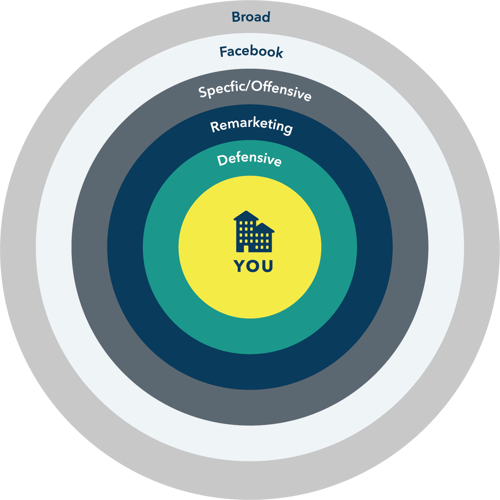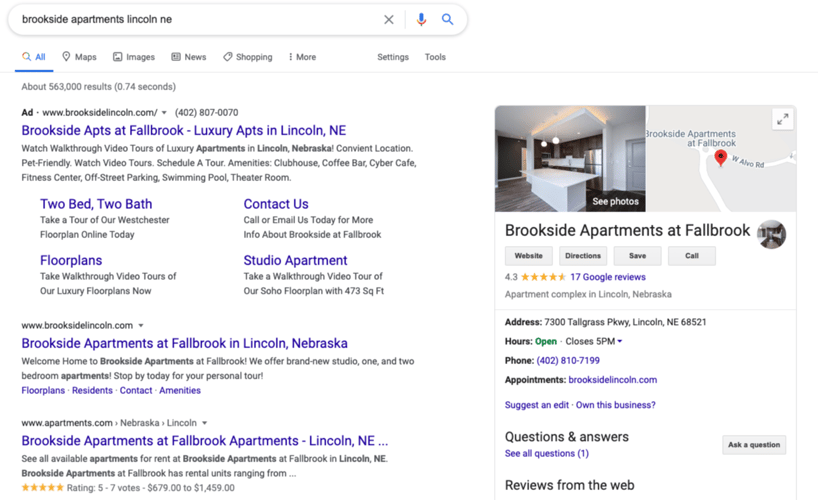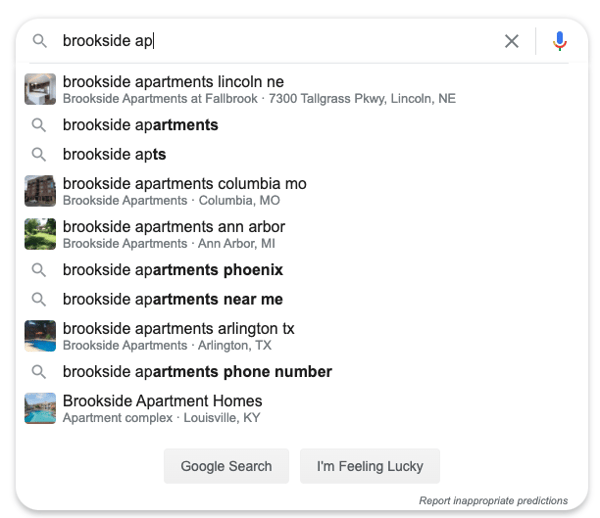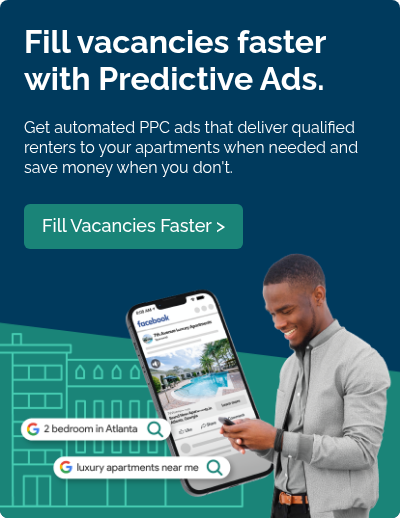Let's say you've recently finished the build of a new, state-of-the-art apartment community near a major university in your city, with amenities that will attract younger potential residents. Your property has become the 'it' place to live, and many students from all parts of the country want to visit your website and apply to live there.
Only, just one problem…
They type in the name of your community in a Google search, and you're nowhere near the top of the search engine results page (SERP). In fact, even though the search query featured the exact name and location of your property, a competitor apartment community in your city dominates the SERP, with a paid advertisement as the first link and their Google My Business page listed in the local search section.
A 2020 study of Google user behavior revealed just how devastating that scenario could be for your apartment community. It provides some really interesting information that emphasizes why defensive advertising campaigns that defend your community's must be a part of your apartment's marketing plan.
In this blog, we'll discuss what defensive advertising is, why it's necessary for apartments, and how searchers are affected by them.
What is defensive advertising and why is it necessary for apartments?
Defensive advertising is a marketing tactic that protects, or defends your community's name or identity against competitors and ensures your property reaches the potential residents actively searching for it.
Defensive advertising works in two forms:
- Your community can bid for Google Adwords that target specific keywords for your community, including the full or partial name of your apartment community, as well as the name of your floorplans.
- Your community can also display digital advertisements that are triggered when a Google user searches for your community by name.

Defensive advertisements are a pivotal part of RentVision's targeted digital advertising strategy because owning search terms of your community's brand are necessary if you're wanting to be able to reach your target audience. They're at the very center of our bullseye for that reason, because their purpose is to impact the potential residents most likely to sign a lease to your community. They're also very affordable, regardless of how much of your budget you've set aside to spend on digital ads.
When a potential resident searches directly for you online, the goal should be that your community is featured at or near the top of the paid, organic, and local search sections of the SERP.

The image above is the “why” behind defensive advertising. This should be what a potential resident sees when searching for your community. The top link is a digital advertisement for this apartment community. The second link is an organic listing of that apartment community. The Google My Business (GMB) area on the right is the local search result. With these three elements highly visible on the top of the SERP, your community earns instant credibility and more importantly, attracts the leads it rightly deserves without a competitor stepping in and poaching your identity for their profit.
How do defensive ads affect Google searches?
The marketing experts at Backlinko analyzed 1,801 Google user behavior sessions to understand how they interact with modern SERP pages.
Here's a few of their interesting findings:
- 50% of users click on their result within 9 seconds of searching.
- Only 9% of searchers make it to the bottom of the first page.
- Only .44% of searchers go to the second page of results.
These statistics reinforce the value of doing what you can to place your community prominently on the SERP, especially when a lead is searching for you directly.
But the most interesting takeaway from the study was this: searchers use one of Google's autocomplete suggestions 23% of the time.
You may have experienced Google's autocomplete feature before without realizing it. This is the list of potential search results that appear as you actively type in your query. When we began to search for a specific apartment community in our hometown of Lincoln, Nebraska, this is what appeared:

Google accurately predicted that it's the community we were searching for based on the keywords being typed. Knowing that users expect to find the exact thing they're searching for within seconds, this places an added importance of defending your community's name and brand in Google.
Conclusion
There's nothing more detrimental to an apartment community than when a competitor community uses your name or specific keywords to target your hard-earned leads with their ads or homepage links in a Google search. In order to prevent this from occurring, you need to run defensive advertising campaigns that protect your identity and make sure that your most qualified leads can easily find you online.
Defensive ads are a pivotal part of RentVision's targeted strategy, and we can work with you to make sure your community is at or near the top of the SERP. Fill out the form below to schedule a time to meet with one of our strategic advisors so we can talk more about your community's marketing strategy.
Continued reading on digital advertising for apartments
- Our complete guide to digital apartment ads is a great place if you're looking to incorporate Google Ads, Meta, or other channels to your multifamily marketing plan.
- Take the next step in your digital advertising journey and learn more about the future of remarketing ads for apartments.


